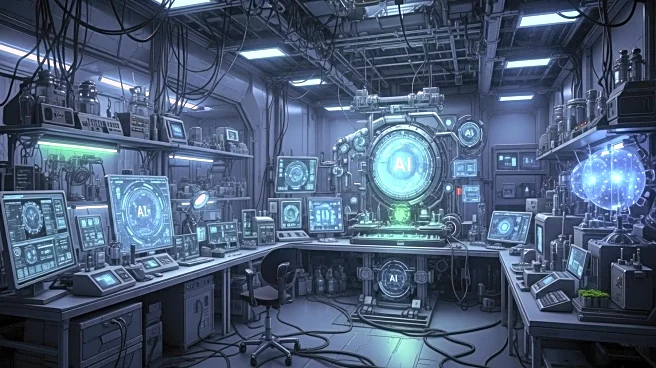What's Happening?
Recent advancements in artificial intelligence (AI) have sparked concerns about the potential for creating bioweapons. A study led by Eric Horvitz, chief scientific officer at Microsoft, explored the possibility of using AI to design proteins that mimic dangerous ones, such as ricin and botulinum, but with different amino acid sequences that evade current detection methods. Although the study did not produce these proteins, it highlighted the limitations of existing screening processes. Additionally, a team at Stanford University attempted to redesign viruses that infect E. coli using AI, with limited success. These developments underscore the dual-use nature of AI in biology, where it can be used for both beneficial and harmful purposes.
Why It's Important?
The potential misuse of AI in designing bioweapons poses significant risks to global security and public health. While current AI-designed proteins and viruses have not proven effective, the technology is rapidly advancing. This raises concerns about the ability of existing regulatory frameworks to keep pace with technological developments. The possibility of AI-designed bioweapons could lead to new forms of bioterrorism, challenging current biosecurity measures. The study emphasizes the need for enhanced vigilance and improved screening methods to prevent the misuse of AI in creating bioweapons, which could have devastating consequences if not properly managed.
What's Next?
As AI technology continues to evolve, there is a pressing need for international collaboration to establish robust regulatory frameworks and screening processes. This includes developing AI tools that can detect and prevent the creation of dangerous biological agents. The scientific community and policymakers must work together to address the ethical and security implications of AI in biotechnology. Additionally, there is a need for increased transparency and cooperation among DNA-synthesis companies to ensure that potentially harmful sequences are not inadvertently produced. Ongoing research and dialogue will be crucial in mitigating the risks associated with AI-designed bioweapons.
Beyond the Headlines
The ethical implications of using AI in biotechnology extend beyond immediate security concerns. The potential for AI to redesign viruses and proteins raises questions about the moral responsibilities of scientists and technologists. There is a need for a broader societal discussion on the acceptable uses of AI in biology and the safeguards necessary to prevent misuse. The intersection of AI and biotechnology also highlights the importance of interdisciplinary collaboration to address complex challenges that span science, ethics, and policy.










